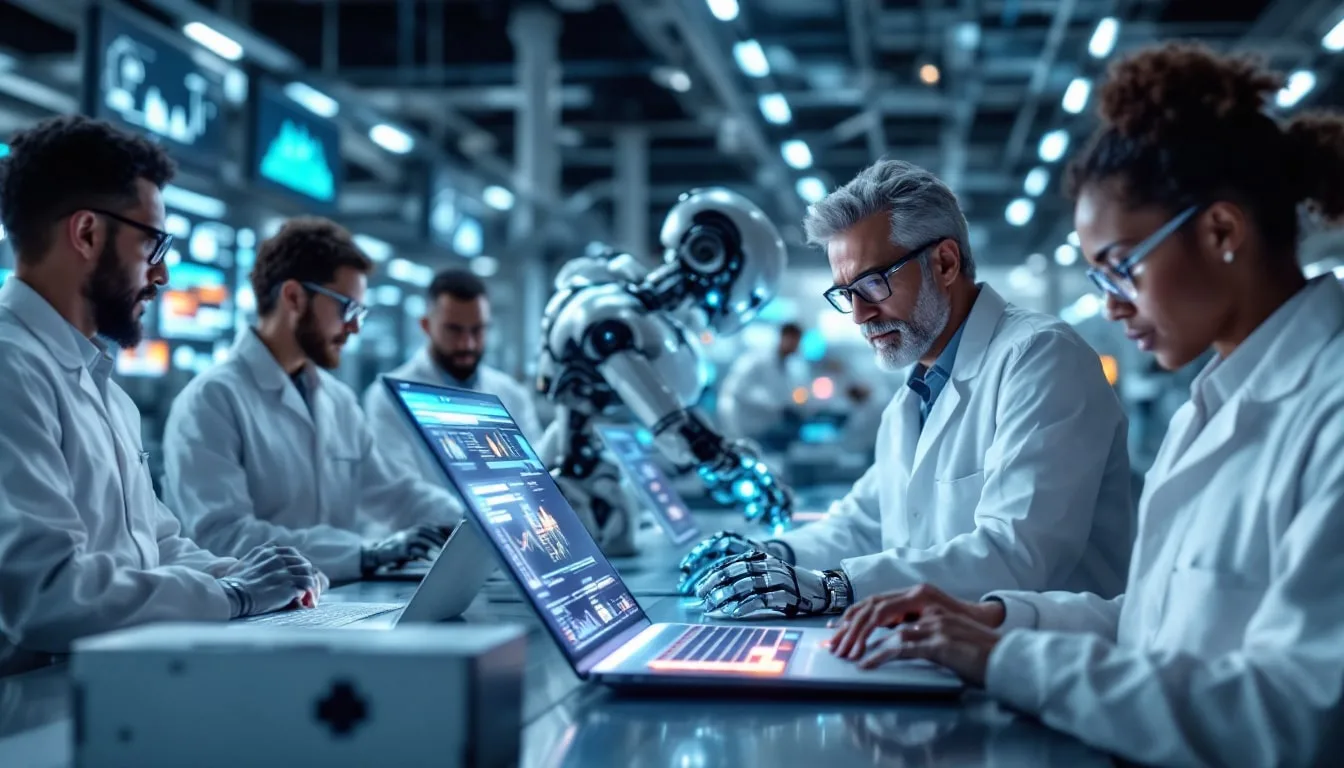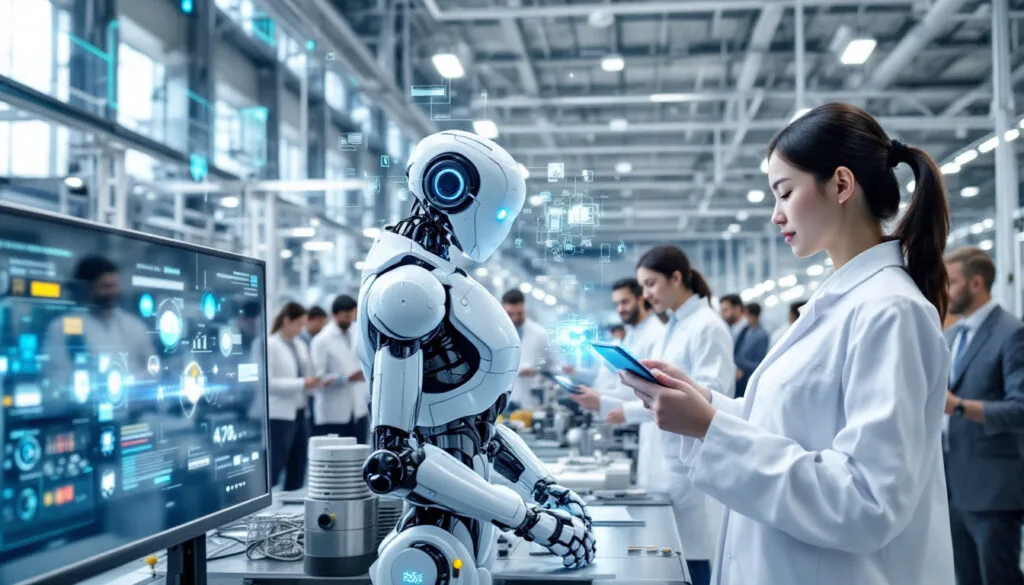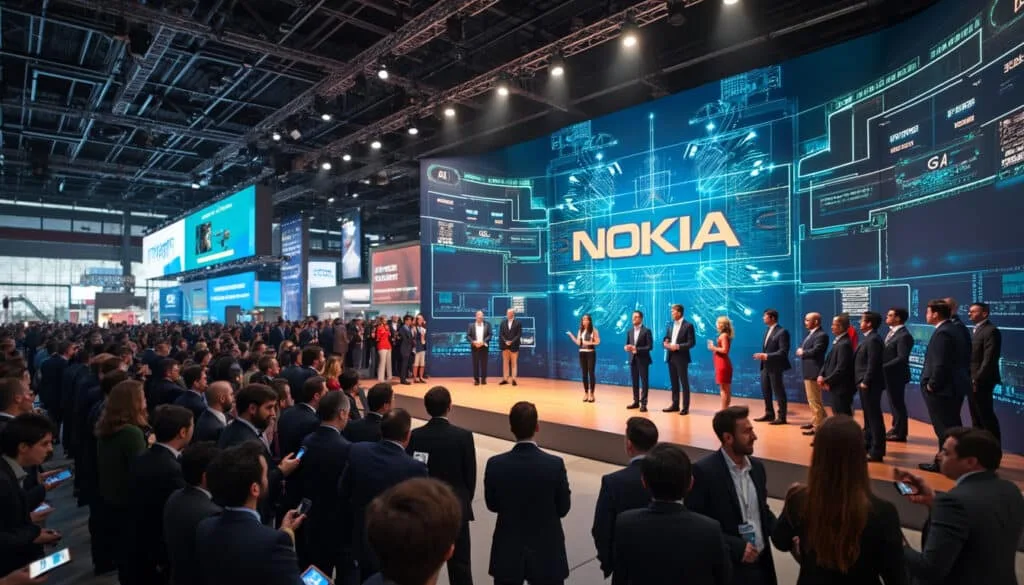“`html
Artificial intelligence is radically transforming the industrial landscape. By 2025, Industry 4.0 is set to undergo a profound transformation. Technological advancements bring both complex challenges and unprecedented opportunities.
The integration of AI into industrial processes enables unprecedented automation and optimization. Cybersecurity is becoming a priority to secure interconnected systems. Moreover, the technical and analytical skills required are evolving to meet new demands. This dynamic shapes a future where Industry 4.0 is both innovative and resilient.

Table des matières
Togglethe revolution of industry 4.0 in europe
The era of Industry 4.0 marks a profound transformation of industrial sectors in Europe, integrating advanced technologies such as artificial intelligence (AI) and the Internet of Things (IoT). This digital revolution aims to optimize production processes, increase productivity, and foster innovation. By 2025, it is estimated that 39% of European manufacturing production will be directly influenced by these technologies. This massive adoption allows companies to respond more effectively to market demands while improving product quality and flexibility.
European initiatives regarding Industry 4.0 are supported by massive investments in research and development. Countries like Germany, France, and Italy are positioning themselves as leaders thanks to favorable policies and strong public-private partnerships. For example, at ProMat 2025, Levata presented intelligent supply chains, thus demonstrating European commitment to technological innovation.
Furthermore, Industry 4.0 is not limited to automation alone. It also encompasses aspects such as sustainability, mass customization, and energy optimization. The integration of AI and IoT allows for real-time monitoring of machine performance, predicting necessary maintenance, and adjusting production processes to minimize waste. This holistic approach contributes to making the European industry more competitive on the global stage.
how ai optimizes production processes
Artificial intelligence (AI) plays a central role in optimizing production processes within Industry 4.0. Through machine learning and predictive algorithms, AI enables companies to make informed decisions based on analyzing large amounts of data. For instance, AI systems can analyze machine performance in real-time, identify inefficiencies, and propose improvements to maximize productivity.
A notable case is that of advanced Alat strategies, which use AI to anticipate equipment failures before they occur, thereby reducing downtime and maintenance costs. This predictive capability is essential for maintaining a smooth and responsive production chain.
Additionally, AI facilitates mass customization, allowing companies to produce goods that meet individual customer specifications without compromising efficiency. By analyzing consumer preferences and automatically adjusting production lines, AI helps manufacturers offer customized products while maintaining competitive production costs.
The integration of AI into production processes also contributes to improving product quality. AI-powered computer vision systems can detect defects invisible to the human eye, ensuring consistent quality and reducing return and complaint rates.
the impact of iot on manufacturing production
The Internet of Things (IoT) is profoundly transforming manufacturing production in Europe by connecting machines, sensors, and computer systems to create an intelligent and interconnected ecosystem. This connectivity allows for real-time monitoring of operations, providing greater visibility over each step of the production process.
Thanks to IoT, companies can collect and analyze valuable data on machine performance, production flows, and environmental conditions. This analysis enables the optimization of resource utilization, minimization of energy costs, and improvement of overall efficiency. For example, the alliance between Industry 4.0 and edge computing stimulates innovation by allowing faster and more localized data processing, thereby reducing latency and improving system responsiveness.
Another crucial aspect of IoT in manufacturing is predictive maintenance. IoT sensors installed on equipment continuously monitor their condition and predict maintenance needs before a failure occurs. This allows for proactive intervention planning, reducing unplanned interruptions and extending the life of machines.
Moreover, IoT facilitates traceability and transparency in the supply chain. Each product can be tracked from its manufacture to its final delivery, ensuring efficient inventory management and rapid response to market demands. This transparency is essential for maintaining high standards of quality and regulatory compliance.
IoT also contributes to sustainability by enabling smarter management of energy and resources. Collected data can be used to optimize production processes, reduce waste, and minimize the carbon footprint of industrial operations.
the challenges of cybersecurity in industry 4.0
With the increased adoption of Industry 4.0, cybersecurity has become a major issue for manufacturing companies. The enhanced connectivity between machines and systems exposes industrial infrastructures to new threats and vulnerabilities. Cyberattacks can lead to significant operational disruptions, financial losses, and damage to the reputation of companies.
Cybercriminals often target industrial networks to access sensitive data, disrupt production processes, or demand ransoms. In this context, it is essential for companies to implement robust security measures to protect their systems and data. Solutions such as network segmentation, data encryption, and multi-factor authentication are crucial for enhancing the security of industrial infrastructures.
Moreover, employee training and awareness of good cybersecurity practices play a crucial role in preventing attacks. Companies must invest in the continuous training of their teams to help them identify and respond effectively to potential threats.
Partnerships with cybersecurity experts and providers of secure technologies can also strengthen companies’ resilience against cyberattacks. For instance, Nokia’s AI-powered platform launched at Mobile World Congress 2025 offers advanced solutions to secure Industry 4.0 applications.
Finally, regulations and standards regarding cybersecurity are evolving to adapt to the new challenges posed by Industry 4.0. Companies must stay informed of the latest directives and integrate them into their security strategies to ensure compliance and protect their digital assets.
the skills needed for industry 4.0
The rise of Industry 4.0 is creating an increasing demand for specialized skills that enable companies to fully leverage advanced technologies such as AI and IoT. Technical skills are not the only ones required; skills in data management, cybersecurity, and critical analysis are also essential.
Industry professionals must be trained in the use and maintenance of automated systems and intelligent machines. Training programs and partnerships with academic institutions, like those offered by Levata at ProMat 2025, are crucial for preparing the workforce for the demands of Industry 4.0.
Moreover, skills in data analysis are essential for interpreting the vast amounts of information generated by IoT systems and AI tools. Data specialists can transform this information into actionable insights, allowing companies to make decisions based on concrete data.
Cybersecurity is another key skill. Professionals must be able to protect industrial systems against cyber threats and respond effectively in case of incidents. Continuous training in this field is essential to keep up with the evolution of threats and defense technologies.
Finally, skills in project management and leadership are important for orchestrating Industry 4.0 initiatives. Leaders must be able to manage organizational changes, integrate new technologies, and promote a culture of innovation within their teams.
case studies: european successes through ai and iot
Many European companies have already demonstrated the benefits of integrating AI and IoT into their production operations. These case studies illustrate how these technologies can transform manufacturing processes and drive growth.
A notable example is that of autonomous cranes in Germany. Thanks to advancements in Industry 4.0, these cranes are now capable of operating autonomously, thereby improving safety on job sites and increasing operational efficiency. This innovation helps reduce costs and optimize the use of human resources.
Another example is Alat’s strategy, unveiled by Amit Midha, which aims to dominate the Industry 4.0 revolution by adopting advanced AI technologies to optimize production chains. This approach has allowed Alat to significantly reduce cycle times and improve the quality of finished products.
Moreover, the platform powered by Nokia’s AI launched at Mobile World Congress 2025 illustrates how cutting-edge technologies can be integrated into industrial applications to enhance connectivity and data management.
These European successes show that the adoption of AI and IoT is not only achievable but also beneficial for manufacturing companies. They serve as inspiring models for other companies seeking to undertake their own digital transformation.
the future outlook of industry 4.0 in europe
As Industry 4.0 continues to evolve, the future outlook for the European manufacturing sector remains promising. Technological advancements, combined with an increased adoption of AI and IoT, will continue to transform how products are designed, manufactured, and distributed.
Innovations in the field of edge computing will enable industrial systems to process data faster and locally, thus reducing latency and improving operational efficiency. This synergy between Industry 4.0 and edge computing will further stimulate innovation in the manufacturing sector.
In addition, the focus on sustainability and environmental responsibility will lead European companies to adopt greener production practices and invest in green technologies. The use of AI to optimize energy consumption and reduce waste will help make the European industry more environmentally friendly.
International partnerships and collaborations among companies, academic institutions, and governments will continue to play a crucial role in the development of Industry 4.0. These collaborations will promote knowledge sharing, collaborative innovation, and the rapid adoption of emerging technologies.
Finally, supply chain resilience will be enhanced through AI and IoT, allowing companies to better anticipate and respond to potential disruptions. This resilience is essential for maintaining competitiveness and stability in the European manufacturing sector in the face of global economic uncertainties.
#>





